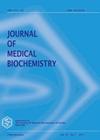通过目标任务为导向的短语训练改善脑外伤术后患者的 Fbg、Ang-1、VEGF 和 BDNF
IF 2
4区 医学
Q4 BIOCHEMISTRY & MOLECULAR BIOLOGY
引用次数: 0
摘要
目的:探讨目标任务导向阶段训练对脑外伤术后患者纤维蛋白原(Fbg)、血管生成素(Ang-1)、血管内皮生长因子(VEGF)、血清脑源性神经营养因子(BDNF)及生活质量的影响。方法:选取2020年3月至2023年3月在我院神经外科手术的142例脑外伤患者,按随机数字表法分为两组。对照组(71 例)接受术后常规训练,实验组(71 例)在对照组基础上接受目标任务导向训练,比较 3、7、14 天血清护理细胞水平。观察护理 2、4 和 6 周后肢体功能和生活质量的改善情况。结果护理前,两组血清因子水平、肢体功能评分、生活质量评分比较,P>0.05;护理 3、7、14 天后,对照组 Fbg 高于实验组;实验组 Ang-1、VEGF、BDNF 水平高于对照组(P<0.05);护理 2 周、4 周、6 周后,对照组上下肢 FMA 评分均低于实验组,P<0.05;对照组生理、环境、心理、社会领域评分均低于实验组,P<0.05。结论在脑外伤术后患者中应用目标任务导向阶段训练,有助于促进血清Fbg、Ang-1、VEGF和BDNF水平的提高,改善肢体功能,提高生活质量。本文章由计算机程序翻译,如有差异,请以英文原文为准。
the The Improvement of Fbg, Ang-1, VEGF, BDNF in Postoperative Patients with Brain Trauma Through Target Task Oriented Phrase Training
Objective:It aims to explore the effect of target task oriented phase training on fibrinogen (Fbg), angiopoietin (Ang-1), vascular endothelial growth factor (VEGF), serum brain derived neurotrophic factor (BDNF) and quality of life in postoperative patients with brain trauma. Methods:142 patients with brain trauma who were operated in neurosurgery of our hospital from March 2020 to March 2023 are chosen and separated into two groups by random number table. The control group (n=71) receive routine postoperative training, and the experimental group (n=71) receive target task oriented training based on the control group, and the serum cell levels of nursing for 3, 7 and 14 days are compared. Improvement of limb function and quality of life after 2, 4, and 6 weeks of nursing care is observed. Results: Before nursing, the comparison in serum factor levels, limb function scores, and quality of life scores between the two groups was with P>0.05; After 3, 7, and 14 days of nursing, the Fbg of the control group was higher than that of the experimental group; The Ang-1, VEGF, and BDNF levels in the experimental group were higher than those in the control group (P<0.05); After 2, 4, and 6 weeks of nursing care, the FMA scores of the upper and lower limbs in the control group were lower than those in the experimental group, with P<0.05; The scores in the physiological, environmental, psychological, and social fields of thecontrol group were lower than those of the experimental group, with P<0.05. Conclusion: The application of target task oriented phase training in patients with brain trauma after surgery can help promote the serum levels of Fbg, Ang-1, VEGF, and BDNF, improve limb function, and enhance quality of life.
求助全文
通过发布文献求助,成功后即可免费获取论文全文。
去求助
来源期刊

Journal of Medical Biochemistry
BIOCHEMISTRY & MOLECULAR BIOLOGY-
CiteScore
3.00
自引率
12.00%
发文量
60
审稿时长
>12 weeks
期刊介绍:
The JOURNAL OF MEDICAL BIOCHEMISTRY (J MED BIOCHEM) is the official journal of the Society of Medical Biochemists of Serbia with international peer-review. Papers are independently reviewed by at least two reviewers selected by the Editors as Blind Peer Reviews. The Journal of Medical Biochemistry is published quarterly.
The Journal publishes original scientific and specialized articles on all aspects of
clinical and medical biochemistry,
molecular medicine,
clinical hematology and coagulation,
clinical immunology and autoimmunity,
clinical microbiology,
virology,
clinical genomics and molecular biology,
genetic epidemiology,
drug measurement,
evaluation of diagnostic markers,
new reagents and laboratory equipment,
reference materials and methods,
reference values,
laboratory organization,
automation,
quality control,
clinical metrology,
all related scientific disciplines where chemistry, biochemistry, molecular biology and immunochemistry deal with the study of normal and pathologic processes in human beings.
 求助内容:
求助内容: 应助结果提醒方式:
应助结果提醒方式:


